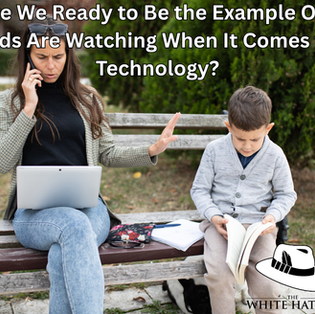Youth, Technology, and Sleep
- The White Hatter

- Jul 1, 2025
- 3 min read

A new 2025 study titled, “Role of Sleep and White Matter in the Link Between Screen Time and Depression in Childhood and Early Adolescence” (1) has come out that buttresses what we have been sharing for years, sleep is important when it comes to the mental health of our kids, especially when it comes to their technology.
Researchers, using data from the ABCD study in the United States, followed 976 children in the U.S., starting at ages 9–10. They tracked how much time the kids spent daily on screens (phones, tablets, TVs, video games), monitored sleep, and checked early signs of depression six months later.
Their Key findings:
More screen time can lead to less sleep
Each extra hour of screen time was linked to roughly 16 minutes less sleep each night
Less sleep can lead to more depressive symptoms
Kids who got less sleep showed “slightly higher” levels of depressive feelings (like sadness, lack of interest) six months later .
Sleep is the bridge
The study found that reduced sleep explained about 42% of the link between screen time and depressive symptoms
Passive screen use (like watching videos or scrolling through social media) had a stronger connection to sleep loss and mood effects than interactive screen time (like playing games or social chatting) .
Not all screen time is harmful. In fact, when used thoughtfully, technology can offer educational content, connection with friends and family, and even stress relief. However, this study reminds us that too much screen time, especially passive use like scrolling social media or binge-watching videos, can eat into the time kids need for sleep. This matters because sleep isn't just about physical rest; it's one of the brain’s most important tools for processing emotions, managing stress, and supporting mood stability.
Getting enough sleep is essential for emotional well-being. When children regularly fall short on sleep, their ability to regulate feelings like sadness, frustration, and anxiety can be affected. This doesn’t mean every bad mood is due to sleep loss, but it does show how sleep plays a protective role during the critical stage of brain development in late childhood and early adolescence.
That’s why it’s important for parents and caregivers to support habits that protect sleep. Simple changes like setting screen curfews, creating device-free zones in the bedroom, and following a consistent bedtime routine can make a big difference. Helping your child understand why sleep matters, and making sure screens don’t crowd it out, can go a long way in supporting their mental health over time.
Practical Parenting Tips When It Come To Sleep and Technology
Set consistent limits on non-essential screen use, particularly in the evenings.
We recommend that youth and teens be off their devices a minimum of 30min - 1hr before going to bed.
Remember, no tech in the bedroom! This includes cellphones, laptops, gaming consoles.
Create a wind-down routine before bed: dim lights, read a book, listen to music, or practice relaxation.
Monitor how much sleep your child gets, aiming for at least 9–11 hours per night for youth and pre-teens.
This study shows a meaningful chain when it comes to your and their use of technology: more screen time, can lead to less sleep, which can lead to more depressive feelings. Helping kids get enough sleep, especially by managing evening screen use, can support their emotional health as they move into adolescence. This study also supports the fact that it is not how much time our kids are online, it is what they are doing with that time that is most important
IMPORTANT NOTE:
The researchers did not recommend that youth and preteens be banned from using technology or accessing the internet. In fact, their conclusion clearly stated:
“These findings underscore the importance of fostering healthy screen time habits and prioritizing adequate sleep to support emotional and brain development.”
Digital Food For Thought
The White Hatter
Facts Not Fear, Facts Not Emotions, Enlighten Not Frighten, Know Tech Not No Tech
References:














